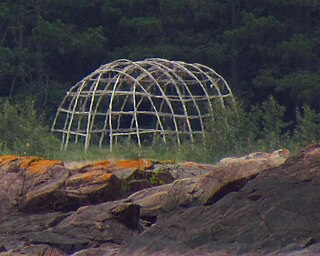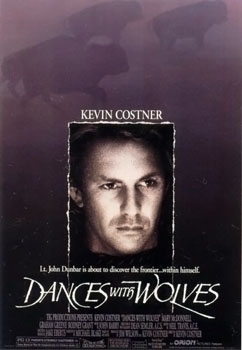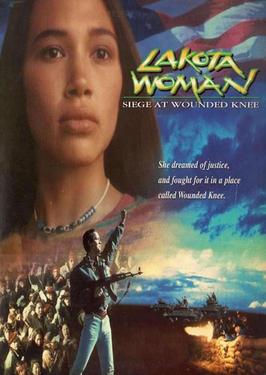Related Research Articles

A sweat lodge is a low profile hut, typically dome-shaped or oblong, and made with natural materials. The structure is the lodge, and the ceremony performed within the structure may be called by some cultures a purification ceremony or simply a sweat.

Dances With Wolves is a 1990 American epic Western film starring, directed, and produced by Kevin Costner in his feature directorial debut. It is a film adaptation of the 1988 novel Dances With Wolves, by Michael Blake, that tells the story of Union Army Lieutenant John J. Dunbar (Costner), who travels to the American frontier to find a military post, and who meets a group of Lakota.

The American Indian Movement (AIM) is an American Indian grassroots movement which was founded in Minneapolis, Minnesota in July 1968, initially centered in urban areas in order to address systemic issues of poverty, discrimination, and police brutality against American Indians. AIM soon widened its focus from urban issues to many Indigenous Tribal issues that American Indian groups have faced due to settler colonialism in the Americas. These issues have included treaty rights, high rates of unemployment, the lack of American Indian subjects in education, and the preservation of Indigenous cultures.

Lakota, also referred to as Lakhota, Teton or Teton Sioux, is a Siouan language spoken by the Lakota people of the Sioux tribes. Lakota is mutually intelligible with the two dialects of the Dakota language, especially Western Dakota, and is one of the three major varieties of the Sioux language.
A vision quest is a rite of passage in some Native American cultures. Individual Indigenous cultures have their own names for their rites of passage. "Vision quest" is an English-language umbrella term, and may not always be accurate or used by the cultures in question.

Wasi'chu is a loanword from the Sioux language which means a non-Indigenous person, particularly a white person, often with a disparaging meaning.
Sioux is a Siouan language spoken by over 30,000 Sioux in the United States and Canada, making it the fifth most spoken Indigenous language in the United States or Canada, behind Navajo, Cree, Inuit languages, and Ojibwe.

The Great Spirit is an omnipresent supreme life force, generally conceptualized as a supreme being or god, in the traditional religious beliefs of many, but not all, indigenous cultures in Canada and the United States. Interpretations of it vary between cultures.

Kevin Edward Locke was of Lakota descent of the Standing Rock Sioux Tribe and Anishinaabe of White Earth. He was a preeminent player of the North American Indigenous Flute, a traditional storyteller, cultural ambassador, recording artist and educator. He was best-known for his hoop dance, The Hoop of Life.
Plastic shamans, or plastic medicine people, is a pejorative colloquialism applied to individuals who attempt to pass themselves off as shamans, holy people, or other traditional spiritual leaders, but who have no genuine connection to the traditions or cultures they claim to represent. In some cases, the "plastic shaman" may have some genuine cultural connection, but is seen to be exploiting that knowledge for ego, power, or money.

Tasunka Kokipapi, was an Oglala Lakota leader known for his participation in Red Cloud's War, as a negotiator for the Sioux Nation after the Wounded Knee Massacre, and for serving on delegations to Washington, D.C.. During and after his lifetime American sources and written records mistranslated his name as Young Man Afraid of His Horses or uncommonly as His Horses Are Afraid, but a proper translation is They Fear Even His Horses or His Horse Is Feared, meaning that the bearer of the name was so feared in battle that even the sight of his horse would inspire fear.

The Oglala are one of the seven subtribes of the Lakota people who, along with the Dakota, make up the Očhéthi Šakówiŋ. A majority of the Oglala live on the Pine Ridge Indian Reservation in South Dakota, the eighth-largest Native American reservation in the United States.

The "AIM Song" is the name given to a Native American intertribal song. Although the song originally did not have a name, it gained its current alias through association with the American Indian Movement. During the takeover of Wounded Knee, it was used as the anthem of the "Independent Oglala Nation."

Lakota Woman: Siege at Wounded Knee is a 1994 TNT film starring Irene Bedard, Tantoo Cardinal, Pato Hoffmann, Joseph Runningfox, Lawrence Bayne, and Michael Horse and August Schellenberg. The film is based on Mary Crow Dog's autobiography Lakota Woman, wherein she accounts her troubled youth, involvement with the American Indian Movement, and relationship with Lakota medicine man and activist Leonard Crow Dog. The film is notable for being the first American film to feature an indigenous Native American actress in the starring role. Lakota Woman is also the third overall and first sound film with an entirely indigenous cast after In the Land of the Head Hunters and Daughter of Dawn.

The Black Hills is an isolated mountain range rising from the Great Plains of North America in western South Dakota and extending into Wyoming, United States. Black Elk Peak, which rises to 7,242 feet (2,207 m), is the range's highest summit. The name of the range in Lakota is Pahá Sápa. It encompasses the Black Hills National Forest. It formed as a result of an upwarping of ancient rock, after which the removal of the higher portions of the mountain mass by stream erosion produced the present-day topography. The hills are so called because of their dark appearance from a distance, as they are covered in evergreen trees.

Two-spirit is a contemporary pan-Indian umbrella term used by some Indigenous North Americans to describe Native people who fulfill a traditional third-gender social role in their communities.
Rita Long Visitor Holy Dance is a Native American spiritual elder who is a member of the Oglala Lakota Tribe and comes from the Pine Ridge Reservation in South Dakota. Through her work as an indigenous elder stateswoman, Rita has gained international recognition through her work as part of the International Council of 13 Indigenous Grandmothers - a group of spiritual elders, medicine women and wisdom keepers since its founding in 2004.

Albert White Hat was a teacher of the Lakota language, and an activist for Sičháŋǧu Lakȟóta traditional culture. He translated the Lakota language for Hollywood movies, including the 1990 movie Dances with Wolves, and created a modern Lakota orthography and textbook.
Indigenous people have created and collaborated on video games, such as John Romero, co-designer of Doom, and Allen Turner, who has worked as a designer on a wide range of titles including Stubbs the Zombie in Rebel Without a Pulse. Indigenous people have also conveyed their cultures through games, such as Never Alone and Thunderbird Strike.

Arvol Looking Horse is a Lakota Native American spiritual leader. He is the 19th keeper of the Sacred White Buffalo Calf Pipe and Bundle.
References
- ↑ "Our People - The Language Conservancy". 2024-05-13. Archived from the original on 2024-05-13. Retrieved 2024-06-12.
- ↑ "Lakota elders helped a white man preserve their language. Then he tried to sell it back to them". NBC News. 2022-06-03. Retrieved 2024-06-12.